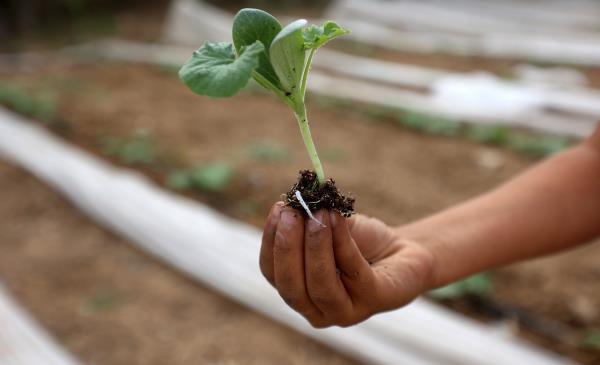Expert consultation workshop on Desalination for Agriculture Development (DAD).

Date: 20 – 21 March 2024 , FAO, Headquarter, Mexico room, Rome, Italy
Background
Agriculture is by far the largest consumer of the Earth's available freshwater: 70% of “blue water” withdrawals from watercourses and groundwater are for agricultural usage, and will be severely affected by water scarcity. By 2050, the global water demand of agriculture is estimated to increase by a further 19% due to irrigational needs. Approximately 40% of the world's food is currently cultivated in irrigated areas (Hanjra et al, 2010).
In the backdrop of shifting climate patterns characterized by rising temperatures, rainfall variability, heatwaves, and increased evapotranspiration, the agricultural sector witnesses substantial setbacks such as crop failures and production shortfalls. These challenges disproportionately affect both “irrigated and rainfed agriculture, leaving vulnerable farming communities and food security at risk. Climate change has led to a reduction in cereal yields. In Near East and North Africa (NENA) region wheat yields decreased by about 20% in some areas.
The COVID-19 pandemic has had impacts on food security, exacerbating land and water inefficiencies. Food price increases were recorded in 2020. The outbreak of the Ukraine war, which further exacerbated the situation, led to a significant surge in food prices. The FAO Food Price Index reached an all-time high in March 2022. This increase in international food prices led to a significant rise in the import costs of food, particularly affecting countries heavily dependent on food imports. Additionally, world fertilizer prices soared, mainly due to rising energy and natural gas prices, which impacted the global agricultural input import costs. (SOFI 2023 - State of food security and nutrition in the world).
In this precarious landscape, non-conventional water resources emerge as a ray of hope. These untapped sources, including desalination, reclaimed water use, and rainwater harvesting, offer alternative solutions to meet water demands for agriculture production. Nowadays, desalination is broadly, and definitely, considered as an efficient mechanism to deal with the challenge of water resource shortage once water demand management measures are implemented, notably in coastal regions where water supplies are scarce or unreliable (Barrón et al., 2015).
The worldwide population relying on desalinated seawater is expected to increase from 7.5% of the world population in 2015 to a projected 18% in 2050 (Cao, L. et al., 2017). Furthermore, in the last six years, the world total water desalination capacity, including brackish water and seawater desalination, increased steadily with an annual rate of about 9% (3ia et al, 2019). Likewise, the global production capacity of desalinated seawater is expected to double by 2040 (Russo et al., 2019).
However, if desalination is already admitted as guaranteed solution to satisfy municipal and industrial water needs, its wide spreading application in irrigation presents a set of challenges and opportunities that require careful consideration to make it affordable and sustainable solution.
In line with these dynamics and under the framework of the Global framework on water Scarcity in Agriculture (WASAG) and the NENA Regional Water Scarcity Initiative (WSI), FAO alongside its partners, is organizing an Experts Consultation workshop on Desalination for Agriculture Development to address opportunities and challenges in the context of changing climate and the global agricultural commodity market.
Objectives
The main objectives of the workshop are:
- Enhancing Common Understanding: To deepen and share knowledge about the opportunities and challenges of using desalinated water in agriculture, particularly in the context of climate change and agricultural market fluctuations.
- Developing Guidance - To identify key milestones and criteria to support decision making and propose recommendations for the safe and sustainable use of desalinated water in agriculture development, aimed at enhancing food security.
- Fostering Connections and Dialogue: To encourage dialogue on strategies to foster informed decision for safe and sustainable use of desalinated water resources in agriculture sector.
Expected Outputs
The workshop is expected to deliver the following outputs:
- Expert Contributions: Presentations and inputs from national, regional, and international experts exploring topics like agronomic prospects, economic and environmental sustainability, technological advances, social inclusion, operational capacity, and regulatory frameworks to form a comprehensive chapter in the event’s proceedings.
- Policy Recommendations: Formulation of policy guidelines and recommendations for governments and stakeholders for promoting investment in desalinated water for agriculture.
- FAO Publication: A document providing an update on the state of desalination opportunities and challenges and offering guidance to member states on leveraging desalination for sustainable agricultural development.
Methodological approach
The workshop will use the following methodology:
- Background paper: Cather and analyze data and information from available literature to identify state of the art of the desalination for agriculture, key trends, insights and discussion questions. This paper served to identify key experts and questions for discussions at the workshop.
- Presentations by Experts: Invite key experts to present current research, case studies, and insights on pertinent topics. Utilize these presentations as a basis for further discussion at the roundtable.
- Roundtable Discussions: Organize expert panels on specific themes such as agronomy, economics, environment, technology, social aspects, and governance. Foster in- depth exploration of each theme through structured dialogue chaired by a moderator.
- Report Compilation: Compile a comprehensive report summarizing the discussions, findings, and recommendations from the workshop. Ensure the report is structured to reflect the different themes and sessions of the workshop.
- Publication Development: Develop a publication based on the workshop's proceedings, to be published by FAO. Include expert contributions, research findings, and policy recommendations on desalination for agriculture development.

Contact
WASAG support team [email protected]
